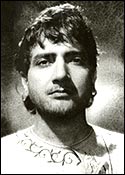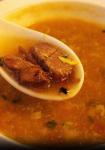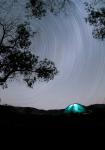Dinesh Raheja
Bharat Bhushan may have never been a swashbuckling hero, but he was just right as the sensitive, suffering poet-musician in several hit musicals in the fifties and sixties.
It is difficult to imagine any other actor in Bhushan roles (Baiju Bawra, Mirza Ghalib, Basant Bahar, Kavi Kalidas, Barsaat Ki Raat and Sangeet Samraat Tansen), where he portrayed an artiste who was at odds with a cruel world but still retained a song on his lips.
Bhushan's films were often extravagant tragedies. Unfortunately, his offscreen life also underwent many upheavals wherein he lost his wife, stardom and faced diminishing fame and fortune.
Stardom knocked on Bharat Bhushan's door only after he had struggled for over a decade. He began his career in his early twenties, with a supporting role in the controversial Chitralekha (1941). But director Kidar Sharma and heroine Mehtab got most of the attention for the film. Bhushan had to wait till the end of the decade for Sharma's Suhaag Raat (1948) to pull his career out of the basement.
After the young and genial Bhushan had successfully played the bone of contention between two strong women, Geeta Bali and Begum Para, in Suhaag Raat, he was signed for several medium-budget films. The most notable of these were Devendra Goel's directorial debut Aankhen (1950), where Bhushan plays a martyr and sacrifices his love for Nalini Jaywant when he realises his brother is also in love with her; and Bimal Roy's first Bombay Talkies film, Maa (1952).
|
Bharat Bhushan's landmark films | ||
|
Year |
Film |
Costars |
|
1952 |
Baiju Bawra |
Meena Kumari, Surendra |
|
1954 |
Mirza Ghalib |
Suraiya, Nigar Sultana |
|
1956 |
Basant Bahar |
Nimmi |
|
1958 |
Phagun |
Madhubala |
|
1959 |
Rani Roopmati |
Nirupa Roy |
|
1960 |
Barsaat Ki Raat |
Madhubala |
|
1962 |
Sangeet Samrat Tansen |
Anita Guha |
|
1964 |
Jahan Ara |
Mala Sinha |
At this stage, veteran filmmaker Vijay Bhatt was casting for his ambitious project, Baiju Bawra (1952). Composer Naushad shrugged off star names like Dilip Kumar and Nargis and insisted on relative newcomers.
Baiju Bawra became a golden jubilee hit and established two new stars: Meena Kumari and Bharat Bhushan. It crystallised Bhushan's image as an actor of 'note.' In Baiju Bawra, Bhushan played a gifted but obsessed musician propelled by twin compulsions -- a desire to extract revenge on court musician Tansen, which he achieves through his music and a deep love for his village sweetheart Gauri.
In an age of heroes with slicked back hair, Bhushan's unruly mop and simple demeanour caught the attention of women in the audience; his ability to convey anguish went down well with the masses.
Bhushan received much help from Naushad's classical raga-based artistry and Mohammad Rafi's vocals as he became the screen face of evergreen numbers like O duniya ke rakhwale, Man tadpat Hari darshan ko aaj and Tu Ganga ki mauj.
Riding the crest of success, the star-director team of Baiju Bawra collaborated once again for Shri Chaitanya Mahaprabhu (1953), for which Bhushan bagged the Filmfare Best Actor Award.
Sohrab Modi's Mirza Ghalib (1954) saw Bhushan playing a poet (the eponymous Ghalib) whose wife and lover were played by Nigar Sultana and Suraiya respectively; in Basant Bahar (1956), he played a singer once again. Basant Bahar was intended to rival Baiju Bawra. It had the same initials and was a musical success, with songs like Duniya na bhaye mohe, Bhay bhajana vandana sun and Sur na saje picturised on Bhushan.
|
Bharat Bhushan's famous songs | ||
|
Song |
Film |
Singer |
|
Man tadpat Hari darshan ko |
Baiju Bawra |
Mohammad Rafi |
|
Dil-e-nadaan tujhe hua kya hai |
Mirza Ghalib |
Talat Mahmood, Suraiya |
|
Sur na saje |
Basant Bahar |
Manna Dey |
|
Do ghadi woh jo paas |
Gateway Of India |
Mohammed Rafi, Lata Mangeshkar |
|
Ek pardesi mera dil le gaya |
Phagun |
Mohammed Rafi, Asha Bhosle |
|
Aa laut ke aaja mere meet |
Rani Roopmati |
Mukesh |
|
Zindagi bhar nahin bhulegi |
Barsaat Ki Raat |
Mohammed Rafi |
|
Jhoomti chali hawa |
Sangeet Samrat Tansen |
Mukesh |
|
Phir wohi shaam |
Jahan Ara |
Talat Mahmood |
|
Jab jab bahaar aaye |
Taqdeer |
Mohammed Rafi |
|
Tum bin jaaoon kahan |
Pyar Ka Mausam |
Kishore Kumar |
One of the second-tier stars of the 1950s, after the Raj Kapoor-Dilip Kumar-Dev Anand triumvirate, Bhushan's list of leading ladies included Meena Kumari, Nargis and Nutan. His well-liked pairing with Madhubala began with his cameo in the Madhubala-centric Gateway Of India, escalated with the success of the musical, Phagun, and reached its peak with Barsaat Ki Raat. Bhushan looked extremely convincing as he wooed her with such Sahir Ludhianvi gems as Mere sheron se bhi tum mujhko haseen lagti ho (You look more beautiful than my couplets to me).
Bhushan was willing to work with a variety of directors like K A Abbas (Gyarah Hazaar Ladkiyaan) and director-composer S N Tripathi (Bhushan played the music-obsessed protagonist in his Rani Roopmati, Kavi Kalidas and Sangeet Samraat Tansen, which yielded a rich haul of melodious numbers).
The 1960s began well for Bhushan with Barsaat Ki Raat and the ensemble hit, Ghunghat (opposite Bina Rai), but there were several younger heroes on the scene now. In 1964, his ambitious colour starrers like Jahan Ara (opposite Mala Sinha) and Dooj Ka Chand (opposite B Saroja Devi) failed to break the bank.
Bhushan's career was clearly on the wane.
His stint as the older man began on a hopeful note with Rajshri's Taqdeer (1967), but the film failed to recreate the Dosti (Sushil Kumar, Sanjay Khan, Sujit Kumar) magic for its producers. Nasir Hussain's Pyar Ka Mausam (1969) had a decent role for Bhushan as the estranged father of protagonist Shashi Kapoor. Realising his acting days were drawing to a close, Bhushan planned to direct a film with Manoj Kumar and Vyjayanthimala in the late 1960s, but the project fell through.
The 1970s were not kind to Bhushan -- it was a pathos-laden comment on the transient nature of fame to see a star of his stature reduced to doing bit roles in inconsequential films.
Bhushan, who had lost his first wife, took consolation in his second marriage to actress Ratna (she co-starred with him in Barsaat Ki Raat) and in his immense library of books till he passed away a little more than a decade ago.





